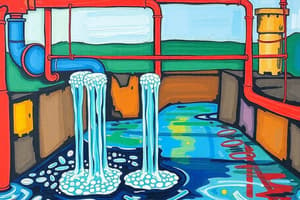Podcast
Questions and Answers
What are the key factors that affect water demand in urban areas?
What are the key factors that affect water demand in urban areas?
The key factors include population density, land use patterns, climate conditions, and economic activities.
Explain the importance of rainwater harvesting systems in urban planning.
Explain the importance of rainwater harvesting systems in urban planning.
Rainwater harvesting systems are crucial for reducing dependency on centralized water supply, managing stormwater, and enhancing water security.
How do conventional and non-conventional power generation methods differ?
How do conventional and non-conventional power generation methods differ?
Conventional methods rely on finite resources like fossil fuels, while non-conventional methods use renewable sources such as solar and wind energy.
What role does network mapping play in water supply systems?
What role does network mapping play in water supply systems?
Describe the significance of demand assessment in power distribution networks.
Describe the significance of demand assessment in power distribution networks.
Flashcards
Water Sources
Water Sources
Places where water is obtained for consumption or use.
Water Demand
Water Demand
The amount of water needed for various uses in an area.
Power Procurement
Power Procurement
Methods of acquiring electricity for use.
Distribution Networks
Distribution Networks
Signup and view all the flashcards
Rainwater Harvesting
Rainwater Harvesting
Signup and view all the flashcards
Study Notes
Module I: Overview
- Water Supply Systems: Focuses on systems, networks, and mapping.
- Water Quality/Quantity: Requirements vary by land use.
- Water Demand Factors: Influencing water usage.
- Storage & Distribution: Details of water facilities.
- Rainwater Harvesting: Systems and location criteria.
- Innovative Water Practices: Successful urban methods.
- Water Programs/Policies: Government strategies.
- Power Systems: Sources of power procurement.
- Power Distribution Networks: Demand assessment, norms, and standards.
- Power Generation: Conventional and non-conventional methods/theories.
- Electricity Network Design/Operation: Related theories and concepts.
Studying That Suits You
Use AI to generate personalized quizzes and flashcards to suit your learning preferences.





